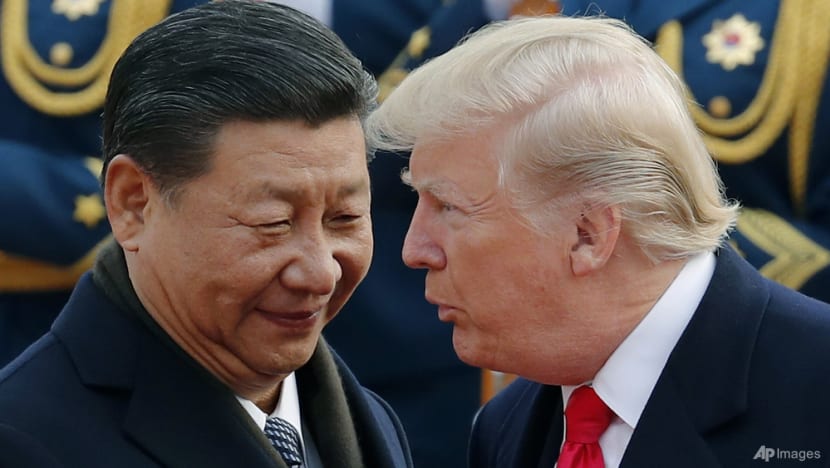Commentary: America has taken a leaf out of China’s international relations playbook
Trump and Xi are overcompensating for years of US-China engagement in which their predecessors made concessions, says RSIS’ Benjamin Ho.


This audio is generated by an AI tool.
SINGAPORE: During the Shangri-La Dialogue over the weekend, United States Defense Secretary Pete Hegseth alluded to America's war-fighting capabilities and characterised its foreign policy under Trump 2.0 as one of “peace through strength”.
This proclamation of strength is consistent with US President Donald Trump’s approach to political relations since he took office. Soft power has been eschewed in place of a more muscular and transactional foreign policy.
Interests - not ideology or values - would be the lens through which the US sees its relations with others. As Mr Hegseth himself put it: “We are not here to pressure other countries to embrace or adopt our politics or ideology ... We respect you, your traditions and your militaries. And we want to work with you where our shared interests align.”
PORTRAYING A STRONG AMERICA
Indeed, we should not be surprised at this show of strength. During the US election campaigning last year, one of the key criticisms Mr Trump and the Republican Party had towards the Democrats was the weakness of then President Joe Biden’s team. Mr Trump promised that under his watch, this would all change.
Seen this way, the Trump administration’s geopolitical manoeuvring stems from the belief that leaders of superpower states cannot afford to look weak - not least in front of their own people.
Mr Trump’s first show of might was to order a blanket tariff across American trading partners, using this as a tool to get other countries to acquiesce to US demands. His bet was that the US domestic market is too important to ignore and that countries worldwide would rather absorb the tariffs than risk losing access to American consumers.
What is happening to US-China competition today is basically this: Both countries are overcompensating for years of engagement in which international cooperation have led to both having to make compromises domestically.
From Washington’s perspective, countries have gotten a free ride on its provision of public goods while Americans have not benefitted from US-led globalisation. As one foreign diplomat told me in a conversation during the SLD, the days of “happy globalisation” is over. International relations have repercussions at home and domestic politics now frequently spill into foreign policy.
According to the Harvard political scientist Robert Putnam, states are constantly engaged in a domestic-international interplay in their relations with each other whereby leaders must fulfil both international and domestic agendas. Ironically, Mr Trump has taken a leaf from the Chinese government playbook and its chief exponent of strongman politics - President Xi Jinping himself.
XI’S PURSUIT OF NATIONAL SECURITY
Beijing’s priorities are strengthening national security and more importantly, ensuring the stability of the Chinese Communist Party.
Since 2012, Mr Xi has gone on the offensive in his pursuit of domestic security while significantly limiting the ability of foreign forces to influence China. From political purges to corruption witch hunts, censorship of information deemed unfavourable to Beijing and wolf warrior diplomacy, Mr Xi hopes to project the face of a strong and uncompromising Chinese state.
This is not unexpected given the perception that party discipline was lax under the policies of his predecessor Hu Jintao and those in power were mostly interested in individual pursuit of wealth and power without a broader commitment to the country’s well-being.
As described by journalist Wong Chun Han in his book Party Of One, Mr Xi is motivated primarily by “historical grievances and a sense of civilisational destiny” and that his China is “brash but brittle, intrepid yet insecure ... a would-be superpower in a hurry, eager to take on the world while wary of what may come”.
This was mostly acutely seen in China’s response to the Trump tariffs. Beijing refused to concede an inch when slapped with a 125 per cent “reciprocal” tariff, and in turn raised levies on US imports and placed restrictions on American movies.
Beijing’s bet was American companies and industries could not stomach the short-term pain of financial losses as a result of restricted access to Chinese markets.
Both countries were proven right: The temperature was eventually dialled down as both Washington and Beijing rolled back their tariff policies.
However, it seems that the Trump administration is now opening a new front in its battle with China in the field of education, as seen by its ban on visas given to Chinese students. It remains to be seen how Beijing will respond.
THE ROAD FORWARD
While the possibility of a grand deal between Washington and Beijing looks even more remote than ever, this hostile climate may not be lasting. As folks in international relations would say, “There are no permanent friends, only permanent interests”.
Both Mr Trump and Mr Xi are overcompensating for what they view as years of benign neglect by their predecessors on the domestic front. At some point, their policies would hurt their countries’ bottom lines.
For instance, the Trump administration’s visa curbs on institutions of higher educations will compromise American ability to attract talent from all over the world. Meanwhile, China would find it increasingly more challenging to gain trust abroad - even among those who are non-allied with the US.
Given that both Mr Trump and Mr Xi cannot afford to look weak in front of their people, strongman politics will likely define the contours of US-China relations in the next few years.
Benjamin Ho is an Assistant Professor at the China Programme, S Rajaratnam School of International Studies. He specialises in the study of Chinese politics, US-China relations and cross-strait relations.


















